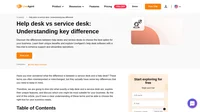What is mobile SDK?
The mobile software development kit (mobile SDK) provides tools for the integration of software directly into your app. This way you can access services from wherever in the world through your mobile device. Actions you can perform with Mobile SDK inside the help desk software industry is to include, create, view and comment on tickets and accessing the knowledge base.
A Mobile SDK (Software Development Kit) is an indispensable toolkit for developers engaged in the mobile app development arena. These kits are comprehensive collections of software development tools designed to facilitate the creation and enhancement of platform-specific mobile applications, such as those for iOS or Android. They offer pre-built functionalities that streamline the development process, enabling developers to integrate complex features with ease and efficiency. The importance of Mobile SDKs has grown in a mobile-first world where delivering a seamless and engaging user experience is paramount. By integrating a mobile SDK into an app, developers can leverage a framework that allows for the creation of sophisticated applications with specific features without starting from scratch.
Understanding Mobile SDKs
- Definition: A Mobile SDK is essentially a downloadable package that provides developers with the necessary tools, libraries, code samples, and documentation to build applications for specific mobile platforms. It supports the development of new apps or augments existing apps with advanced features without requiring developers to start coding from scratch.
- Components: Typical components of a mobile SDK include:
- Code Libraries: Pre-written code sequences that developers can reuse, acting as shortcuts for common functionalities.
- APIs (Application Programming Interfaces): Enable communication between different software components, providing ready-to-use functions.
- Documentation: Guides and instructions to help developers understand and implement the SDK effectively. Comprehensive documentation is crucial for guiding developers through integration and usage.
- Code Samples: Example codes that demonstrate how to use the SDK in real-world scenarios.
- Debugging Tools: Assist in identifying and fixing errors in the code, ensuring smooth application operation.
- Testing Tools: Facilitate the testing of applications to ensure performance and stability. These tools are essential for simulating real-world conditions during development.
How Mobile SDKs Work
- Integration: Developers integrate SDKs into their app development environment by linking the necessary libraries and configuring settings. This process often involves modifying the app’s source code to accommodate new functionalities provided by the SDK.
- Functionality: SDKs offer prebuilt APIs and libraries that provide ready-to-use functions, reducing the need for additional coding. They include tools for testing and debugging during the development process to ensure the app operates smoothly.
- Updates and Support: SDKs are frequently updated by their providers to include new features, fix bugs, and maintain compatibility with the latest operating systems. Developers can access support through documentation, forums, and direct communication with the SDK provider.
The Importance of Mobile SDKs
- Time and Cost Efficiency: Mobile SDKs save developers significant time and resources by offering pre-built solutions that eliminate the need to develop functionalities from the ground up. This efficiency accelerates time-to-market and allows businesses to maintain a competitive edge.
- Enhanced Functionality: SDKs enable the integration of advanced app features such as push notifications, in-app advertising, social media integration, and location-based services, improving the overall user experience.
- Performance and Stability: Well-designed SDKs are optimized for performance, ensuring that apps run efficiently without negatively impacting device resources like battery life or data consumption.
Types of Mobile SDKs
- Ads & Monetization SDKs: Integrate advertising features into apps to generate revenue.
- Analytics SDKs: Provide insights into user behavior and app performance to optimize user engagement.
- Payment SDKs: Facilitate secure payment processing within apps.
- Notification SDKs: Enable the sending of push notifications to engage and inform users.
Choosing the Right Mobile SDK
- Compatibility: Ensure the SDK is compatible with your app’s platform and development tools.
- Documentation and Support: Look for comprehensive documentation and robust support channels to assist in implementation.
- Performance and Stability: Check reviews and feedback to ensure the SDK doesn’t compromise app performance.
- Security: Evaluate the SDK’s approach to data protection and privacy.
Examples of Popular Mobile SDKs
- Google Analytics SDK: Tracks user interactions and app performance data.
- Facebook SDK: Facilitates social media integration and provides analytics.
- Google Maps SDK: Offers mapping and location services.
- Stripe SDK: Manages payment processing for multiple payment methods.
Frequently Asked Questions
What does a mobile SDK stand for?
The SDK or Software Development Kit is a downloadable software package that contains the tools needed to build on the platform. SDK allows you to integrate the software with the application. Thanks to this, you can access services from anywhere in the world using a mobile device.
What actions can you perform with a mobile SDK?
The mobile SDK allows you to integrate the software with the application. Thanks to this, you can expand the area of your activities. The activities that can be performed using the Mobile SDK are creating, viewing, and commenting on tickets and access to the knowledge base, if supported by help desk software.
After learning about Mobile SDKs on this page, you might be interested in exploring how mobile help desk apps can enhance your customer support. Discover the cost and features of the LiveAgent app for both Android and iOS, and see how it can help you improve customer service. If privacy and security are your main concerns, check out our guide on GDPR-compliant help desk software. Learn how LiveAgent ensures your data is handled securely and meets all necessary compliance requirements. For those seeking alternatives, consider why LiveAgent is a top choice compared to other options like Desk.com by visiting our Desk.com alternative page. Understand the benefits of switching and how LiveAgent can better serve your business needs. Lastly, if you want to track how well your agents are performing, the agent report feature provides various display options and chart types to visualize your data effectively. This tool can help you identify areas for improvement and ensure your team is delivering top-notch service.
Customer service management explained: Essential tools and techniques
Discover effective Customer Service Management strategies to boost satisfaction, loyalty, and brand reputation. Elevate your customer experience!
Help desk vs service desk: Understanding key difference
Discover the key differences between help desks and service desks to choose the best fit for your business needs. Learn about their unique features, benefits, and find expert guidance on selecting the right tool. Plus, enjoy a free trial of LiveAgent's renowned help desk software and elevate your customer service today!

 Български
Български  Čeština
Čeština  Dansk
Dansk  Deutsch
Deutsch  Eesti
Eesti  Español
Español  Français
Français  Ελληνικα
Ελληνικα  Hrvatski
Hrvatski  Italiano
Italiano  Latviešu
Latviešu  Lietuviškai
Lietuviškai  Magyar
Magyar  Nederlands
Nederlands  Norsk bokmål
Norsk bokmål  Polski
Polski  Română
Română  Русский
Русский  Slovenčina
Slovenčina  Slovenščina
Slovenščina  简体中文
简体中文  Tagalog
Tagalog  Tiếng Việt
Tiếng Việt  العربية
العربية  Português
Português 




